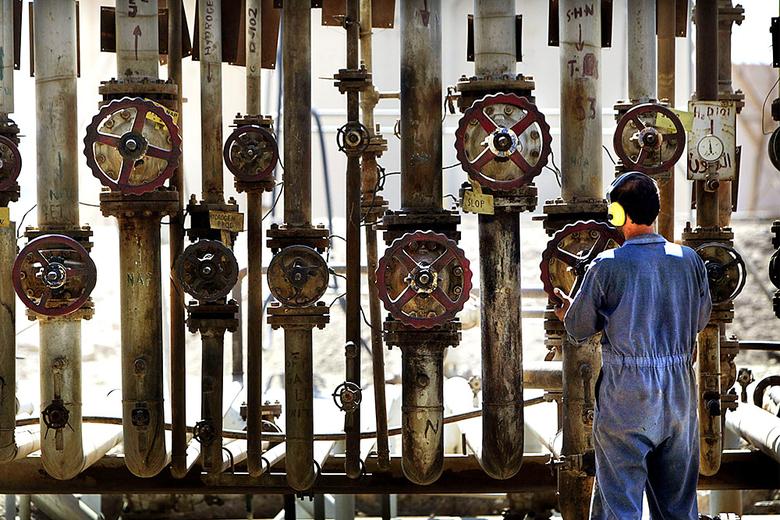
FAILING OIL PRICES

Shares in the world's biggest energy groups have tumbled in a market rout as plunging oil prices put at risk billions of dollars of investment and jeopardised future supplies of crude.
The sharp slide in the price of Brent oil after Opec's decision not to cut output triggered warnings that oil companies would cut as much as $100bn of capital spending in response, imperilling the US shale bonanza and threatening much Arctic oil exploration.
Meanwhile oil's fall continued to play havoc with the currencies of oil exporting countries, especially Russia. At one point on Friday, the rouble slid to a record low.
Leonid Fedun, vice-president of Lukoil, Russia's second largest crude producer, told the Financial Times that Opec was trying to turn the US shale oil "boom" into a "bust" for smaller producers.
He compared the surge in North American shale to the dotcom and subprime mortgage booms, and said Opec's objective now was "to get small producers with large debts and low efficiency to pack up and leave the market".
Opec said on Thursday that it was leaving its output ceiling of 30m barrels a day unchanged, prompting a swift 8 per cent drop in the oil price, which was already down by nearly 40 per cent since mid-June. Brent fell $2.80 on Friday to $69.78, a four-year low.
The move showed that Saudi Arabia, Opec's largest producer and effective leader, had decided to relinquish its traditional role of balancing the oil market by increasing or reducing output, letting prices do the job instead, analysts said.
"We cannot overstate what a dramatic and fundamental change this is for the oil market," said Mike Wittner, senior oil analyst at Société Générale.
Friday's brutal sell-off in the US and across Europe hit shares in the oil majors, the big oil services companies that supply them, as well as the smaller explorers most exposed to the plunge in crude. ExxonMobil fell 4.3 per cent, Chevron 5.4 per cent and oilfield services group Halliburton 11.1 per cent. They recovered slightly by the close.
But the slide could bring relief for motorists. In the UK, the Petrol Retailers Association said it could trim the average price of petrol, currently 122.6p per litre, by another two pence over the next couple of weeks.
The price fall has sent a chill through the US shale sector, which had driven US oil production to its highest level in more than three decades. Analysts at Tudor Pickering Holt, the energy investment bank, warned that, with US crude at or below $70, "no basin is safe" from cuts in drilling activity. WTI, the US benchmark, is currently trading below $67 a barrel.
The Bakken shale of North Dakota and the Mississippian Lime region of Oklahoma would be among the regions bearing the initial brunt of the slowdown, they said.
The critical factor determining the pace of the slowdown will be the debt levels of the US independent oil and gas companies that have led the shale boom. With oil at $70, exploration and production companies will cut back spending on new wells to prevent their debt burdens rising.
Wood Mackenzie, the energy consultancy, said if Brent stayed below $75-80, US shale oil supplies could be reduced by 0.6m b/d by the end of 2015.
Other high-cost sources of oil, such as Canadian oil sands, could be affected. Andrew Leach of Alberta University said that production of bitumen by mining was typically only viable at over C$50 per barrel, the current market price. He added: "If we see sustained low prices [for conventional oil] some oil sand projects will have to stop."
Arctic exploration could also be hit if crude stays low. Mr Fedun told Bloomberg he did not expect the development of oil reserves in the Arctic on a significant scale to happen within his lifetime.
Oswald Clint of Bernstein Research warned that the response would be similar to 2009, when non-Opec capital expenditure, excluding acquisitions, fell by 16 per cent or $100bn after the oil price plunged from record highs.
Falling oil prices, meanwhile, are driving down expectations for global inflation, putting additional pressure on central banks to step up economic stimulus programmes.
Inflation in the eurozone returned to a five-year low of 0.3 per cent in November as energy prices in the currency bloc slipped. Eurozone government debt rallied in the wake of Friday's reading, sending yields in countries including Germany and France to record lows as investors focused on the possibility of a government debt purchasing programme by the European Central Bank to boost inflation.
In the UK, yields on longer term 30 year bonds also hit a record low of 2.66 per cent on Friday.
ft.com




